MITS6011 Research Proposal: Impact of Video Games on Children
VerifiedAdded on 2022/09/10
|5
|1751
|21
Report
AI Summary
This research proposal investigates the advantages and disadvantages of using educational video games on children, particularly focusing on their impact on cognitive skills, behavior, and overall learning. It differentiates between casual, serious, and educational games, examining their respective effects. The study employs a quantitative approach, utilizing questionnaire surveys from Australian primary school staff and parents to gather data. A deductive approach is used to test existing theories. The research aims to contribute to the ongoing debate about integrating video games into education, providing insights for educators, parents, and institutions considering this approach. The proposal outlines a timeline for research activities, including literature review, data collection, data analysis, and thesis finalization.
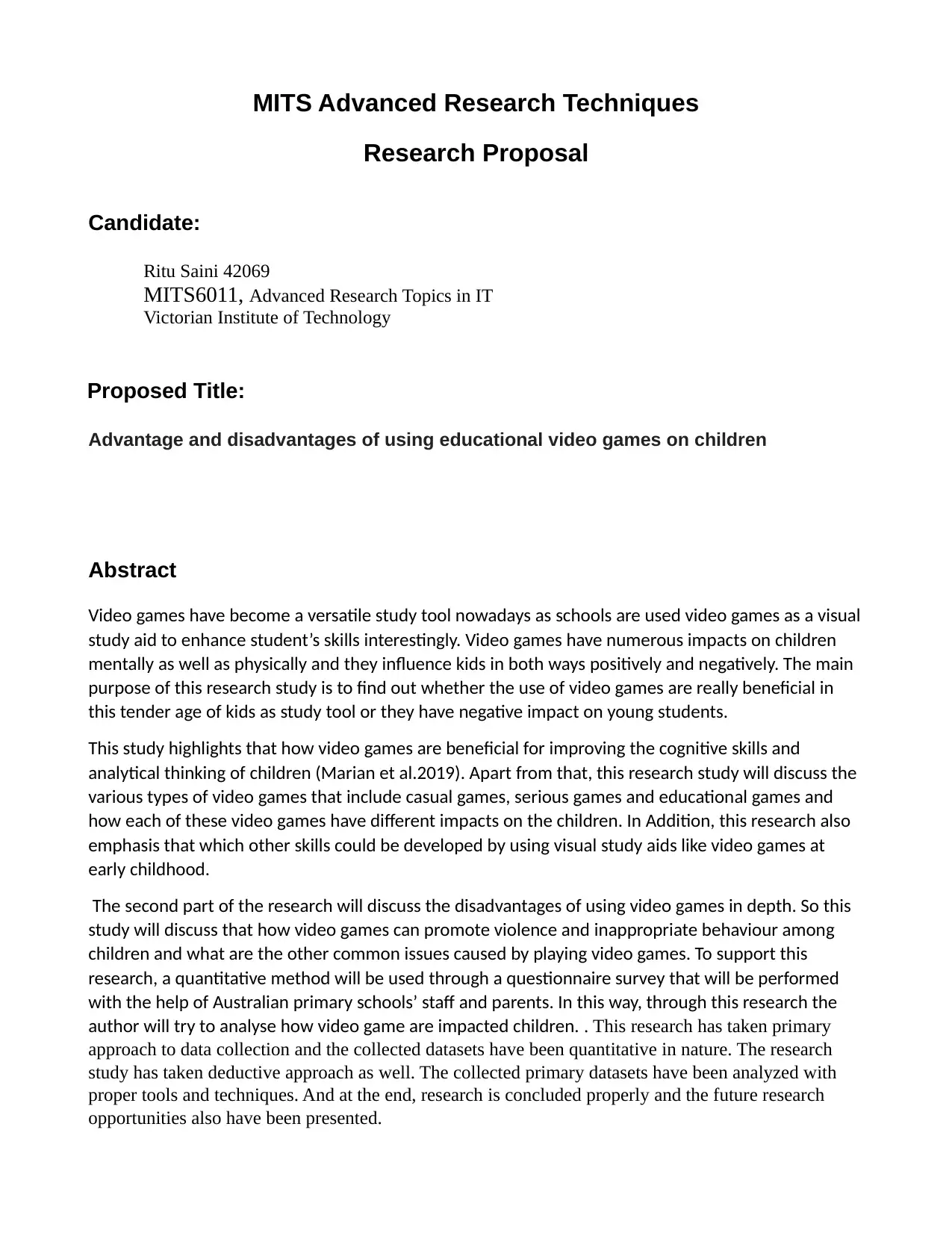
MITS Advanced Research Techniques
Research Proposal
Candidate:
Ritu Saini 42069
MITS6011, Advanced Research Topics in IT
Victorian Institute of Technology
Proposed Title:
Advantage and disadvantages of using educational video games on children
Abstract
Video games have become a versatile study tool nowadays as schools are used video games as a visual
study aid to enhance student’s skills interestingly. Video games have numerous impacts on children
mentally as well as physically and they influence kids in both ways positively and negatively. The main
purpose of this research study is to find out whether the use of video games are really beneficial in
this tender age of kids as study tool or they have negative impact on young students.
This study highlights that how video games are beneficial for improving the cognitive skills and
analytical thinking of children (Marian et al.2019). Apart from that, this research study will discuss the
various types of video games that include casual games, serious games and educational games and
how each of these video games have different impacts on the children. In Addition, this research also
emphasis that which other skills could be developed by using visual study aids like video games at
early childhood.
The second part of the research will discuss the disadvantages of using video games in depth. So this
study will discuss that how video games can promote violence and inappropriate behaviour among
children and what are the other common issues caused by playing video games. To support this
research, a quantitative method will be used through a questionnaire survey that will be performed
with the help of Australian primary schools’ staff and parents. In this way, through this research the
author will try to analyse how video game are impacted children. . This research has taken primary
approach to data collection and the collected datasets have been quantitative in nature. The research
study has taken deductive approach as well. The collected primary datasets have been analyzed with
proper tools and techniques. And at the end, research is concluded properly and the future research
opportunities also have been presented.
Research Proposal
Candidate:
Ritu Saini 42069
MITS6011, Advanced Research Topics in IT
Victorian Institute of Technology
Proposed Title:
Advantage and disadvantages of using educational video games on children
Abstract
Video games have become a versatile study tool nowadays as schools are used video games as a visual
study aid to enhance student’s skills interestingly. Video games have numerous impacts on children
mentally as well as physically and they influence kids in both ways positively and negatively. The main
purpose of this research study is to find out whether the use of video games are really beneficial in
this tender age of kids as study tool or they have negative impact on young students.
This study highlights that how video games are beneficial for improving the cognitive skills and
analytical thinking of children (Marian et al.2019). Apart from that, this research study will discuss the
various types of video games that include casual games, serious games and educational games and
how each of these video games have different impacts on the children. In Addition, this research also
emphasis that which other skills could be developed by using visual study aids like video games at
early childhood.
The second part of the research will discuss the disadvantages of using video games in depth. So this
study will discuss that how video games can promote violence and inappropriate behaviour among
children and what are the other common issues caused by playing video games. To support this
research, a quantitative method will be used through a questionnaire survey that will be performed
with the help of Australian primary schools’ staff and parents. In this way, through this research the
author will try to analyse how video game are impacted children. . This research has taken primary
approach to data collection and the collected datasets have been quantitative in nature. The research
study has taken deductive approach as well. The collected primary datasets have been analyzed with
proper tools and techniques. And at the end, research is concluded properly and the future research
opportunities also have been presented.
Paraphrase This Document
Need a fresh take? Get an instant paraphrase of this document with our AI Paraphraser
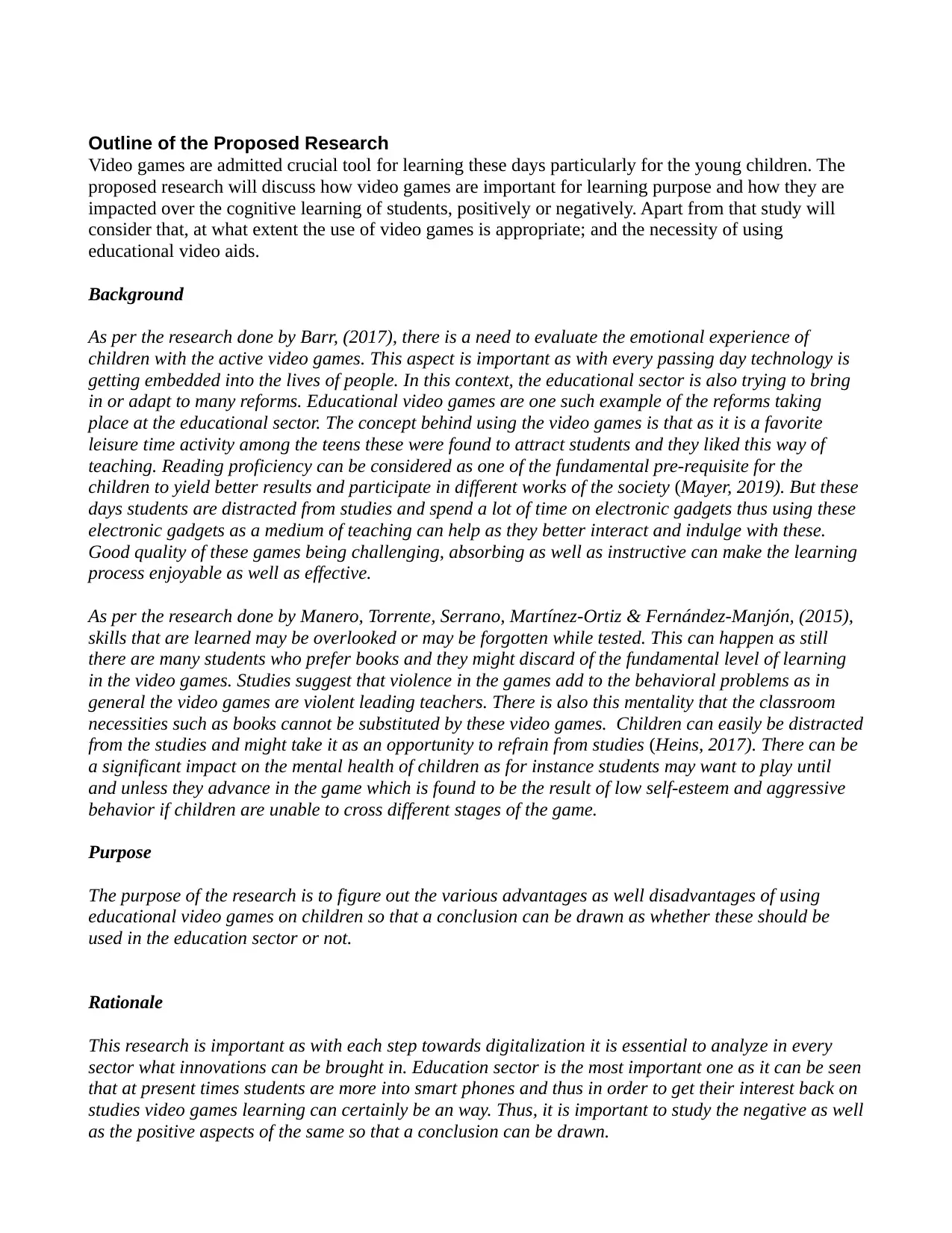
Outline of the Proposed Research
Video games are admitted crucial tool for learning these days particularly for the young children. The
proposed research will discuss how video games are important for learning purpose and how they are
impacted over the cognitive learning of students, positively or negatively. Apart from that study will
consider that, at what extent the use of video games is appropriate; and the necessity of using
educational video aids.
Background
As per the research done by Barr, (2017), there is a need to evaluate the emotional experience of
children with the active video games. This aspect is important as with every passing day technology is
getting embedded into the lives of people. In this context, the educational sector is also trying to bring
in or adapt to many reforms. Educational video games are one such example of the reforms taking
place at the educational sector. The concept behind using the video games is that as it is a favorite
leisure time activity among the teens these were found to attract students and they liked this way of
teaching. Reading proficiency can be considered as one of the fundamental pre-requisite for the
children to yield better results and participate in different works of the society (Mayer, 2019). But these
days students are distracted from studies and spend a lot of time on electronic gadgets thus using these
electronic gadgets as a medium of teaching can help as they better interact and indulge with these.
Good quality of these games being challenging, absorbing as well as instructive can make the learning
process enjoyable as well as effective.
As per the research done by Manero, Torrente, Serrano, Martínez-Ortiz & Fernández-Manjón, (2015),
skills that are learned may be overlooked or may be forgotten while tested. This can happen as still
there are many students who prefer books and they might discard of the fundamental level of learning
in the video games. Studies suggest that violence in the games add to the behavioral problems as in
general the video games are violent leading teachers. There is also this mentality that the classroom
necessities such as books cannot be substituted by these video games. Children can easily be distracted
from the studies and might take it as an opportunity to refrain from studies (Heins, 2017). There can be
a significant impact on the mental health of children as for instance students may want to play until
and unless they advance in the game which is found to be the result of low self-esteem and aggressive
behavior if children are unable to cross different stages of the game.
Purpose
The purpose of the research is to figure out the various advantages as well disadvantages of using
educational video games on children so that a conclusion can be drawn as whether these should be
used in the education sector or not.
Rationale
This research is important as with each step towards digitalization it is essential to analyze in every
sector what innovations can be brought in. Education sector is the most important one as it can be seen
that at present times students are more into smart phones and thus in order to get their interest back on
studies video games learning can certainly be an way. Thus, it is important to study the negative as well
as the positive aspects of the same so that a conclusion can be drawn.
Video games are admitted crucial tool for learning these days particularly for the young children. The
proposed research will discuss how video games are important for learning purpose and how they are
impacted over the cognitive learning of students, positively or negatively. Apart from that study will
consider that, at what extent the use of video games is appropriate; and the necessity of using
educational video aids.
Background
As per the research done by Barr, (2017), there is a need to evaluate the emotional experience of
children with the active video games. This aspect is important as with every passing day technology is
getting embedded into the lives of people. In this context, the educational sector is also trying to bring
in or adapt to many reforms. Educational video games are one such example of the reforms taking
place at the educational sector. The concept behind using the video games is that as it is a favorite
leisure time activity among the teens these were found to attract students and they liked this way of
teaching. Reading proficiency can be considered as one of the fundamental pre-requisite for the
children to yield better results and participate in different works of the society (Mayer, 2019). But these
days students are distracted from studies and spend a lot of time on electronic gadgets thus using these
electronic gadgets as a medium of teaching can help as they better interact and indulge with these.
Good quality of these games being challenging, absorbing as well as instructive can make the learning
process enjoyable as well as effective.
As per the research done by Manero, Torrente, Serrano, Martínez-Ortiz & Fernández-Manjón, (2015),
skills that are learned may be overlooked or may be forgotten while tested. This can happen as still
there are many students who prefer books and they might discard of the fundamental level of learning
in the video games. Studies suggest that violence in the games add to the behavioral problems as in
general the video games are violent leading teachers. There is also this mentality that the classroom
necessities such as books cannot be substituted by these video games. Children can easily be distracted
from the studies and might take it as an opportunity to refrain from studies (Heins, 2017). There can be
a significant impact on the mental health of children as for instance students may want to play until
and unless they advance in the game which is found to be the result of low self-esteem and aggressive
behavior if children are unable to cross different stages of the game.
Purpose
The purpose of the research is to figure out the various advantages as well disadvantages of using
educational video games on children so that a conclusion can be drawn as whether these should be
used in the education sector or not.
Rationale
This research is important as with each step towards digitalization it is essential to analyze in every
sector what innovations can be brought in. Education sector is the most important one as it can be seen
that at present times students are more into smart phones and thus in order to get their interest back on
studies video games learning can certainly be an way. Thus, it is important to study the negative as well
as the positive aspects of the same so that a conclusion can be drawn.
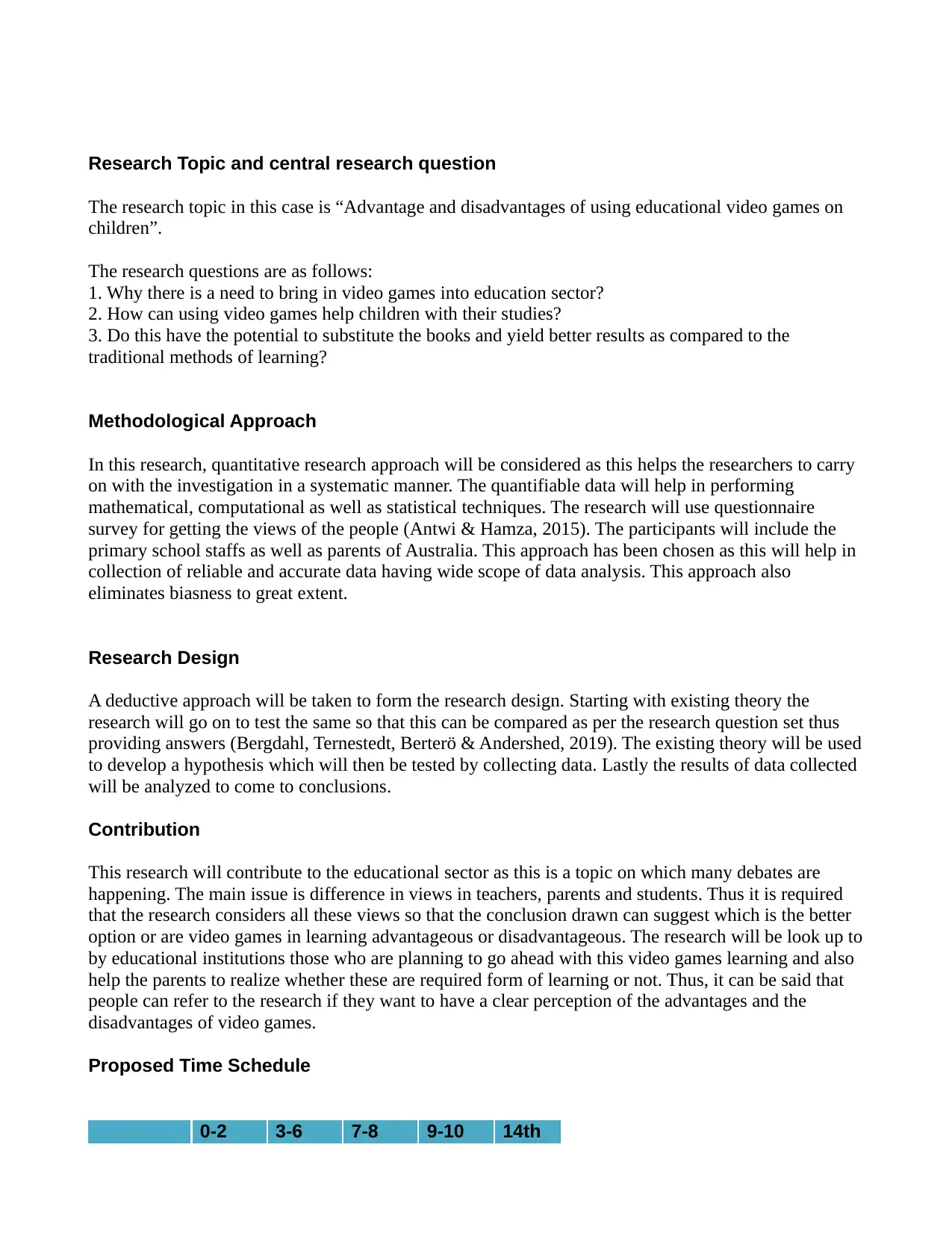
Research Topic and central research question
The research topic in this case is “Advantage and disadvantages of using educational video games on
children”.
The research questions are as follows:
1. Why there is a need to bring in video games into education sector?
2. How can using video games help children with their studies?
3. Do this have the potential to substitute the books and yield better results as compared to the
traditional methods of learning?
Methodological Approach
In this research, quantitative research approach will be considered as this helps the researchers to carry
on with the investigation in a systematic manner. The quantifiable data will help in performing
mathematical, computational as well as statistical techniques. The research will use questionnaire
survey for getting the views of the people (Antwi & Hamza, 2015). The participants will include the
primary school staffs as well as parents of Australia. This approach has been chosen as this will help in
collection of reliable and accurate data having wide scope of data analysis. This approach also
eliminates biasness to great extent.
Research Design
A deductive approach will be taken to form the research design. Starting with existing theory the
research will go on to test the same so that this can be compared as per the research question set thus
providing answers (Bergdahl, Ternestedt, Berterö & Andershed, 2019). The existing theory will be used
to develop a hypothesis which will then be tested by collecting data. Lastly the results of data collected
will be analyzed to come to conclusions.
Contribution
This research will contribute to the educational sector as this is a topic on which many debates are
happening. The main issue is difference in views in teachers, parents and students. Thus it is required
that the research considers all these views so that the conclusion drawn can suggest which is the better
option or are video games in learning advantageous or disadvantageous. The research will be look up to
by educational institutions those who are planning to go ahead with this video games learning and also
help the parents to realize whether these are required form of learning or not. Thus, it can be said that
people can refer to the research if they want to have a clear perception of the advantages and the
disadvantages of video games.
Proposed Time Schedule
0-2 3-6 7-8 9-10 14th
The research topic in this case is “Advantage and disadvantages of using educational video games on
children”.
The research questions are as follows:
1. Why there is a need to bring in video games into education sector?
2. How can using video games help children with their studies?
3. Do this have the potential to substitute the books and yield better results as compared to the
traditional methods of learning?
Methodological Approach
In this research, quantitative research approach will be considered as this helps the researchers to carry
on with the investigation in a systematic manner. The quantifiable data will help in performing
mathematical, computational as well as statistical techniques. The research will use questionnaire
survey for getting the views of the people (Antwi & Hamza, 2015). The participants will include the
primary school staffs as well as parents of Australia. This approach has been chosen as this will help in
collection of reliable and accurate data having wide scope of data analysis. This approach also
eliminates biasness to great extent.
Research Design
A deductive approach will be taken to form the research design. Starting with existing theory the
research will go on to test the same so that this can be compared as per the research question set thus
providing answers (Bergdahl, Ternestedt, Berterö & Andershed, 2019). The existing theory will be used
to develop a hypothesis which will then be tested by collecting data. Lastly the results of data collected
will be analyzed to come to conclusions.
Contribution
This research will contribute to the educational sector as this is a topic on which many debates are
happening. The main issue is difference in views in teachers, parents and students. Thus it is required
that the research considers all these views so that the conclusion drawn can suggest which is the better
option or are video games in learning advantageous or disadvantageous. The research will be look up to
by educational institutions those who are planning to go ahead with this video games learning and also
help the parents to realize whether these are required form of learning or not. Thus, it can be said that
people can refer to the research if they want to have a clear perception of the advantages and the
disadvantages of video games.
Proposed Time Schedule
0-2 3-6 7-8 9-10 14th
⊘ This is a preview!⊘
Do you want full access?
Subscribe today to unlock all pages.

Trusted by 1+ million students worldwide
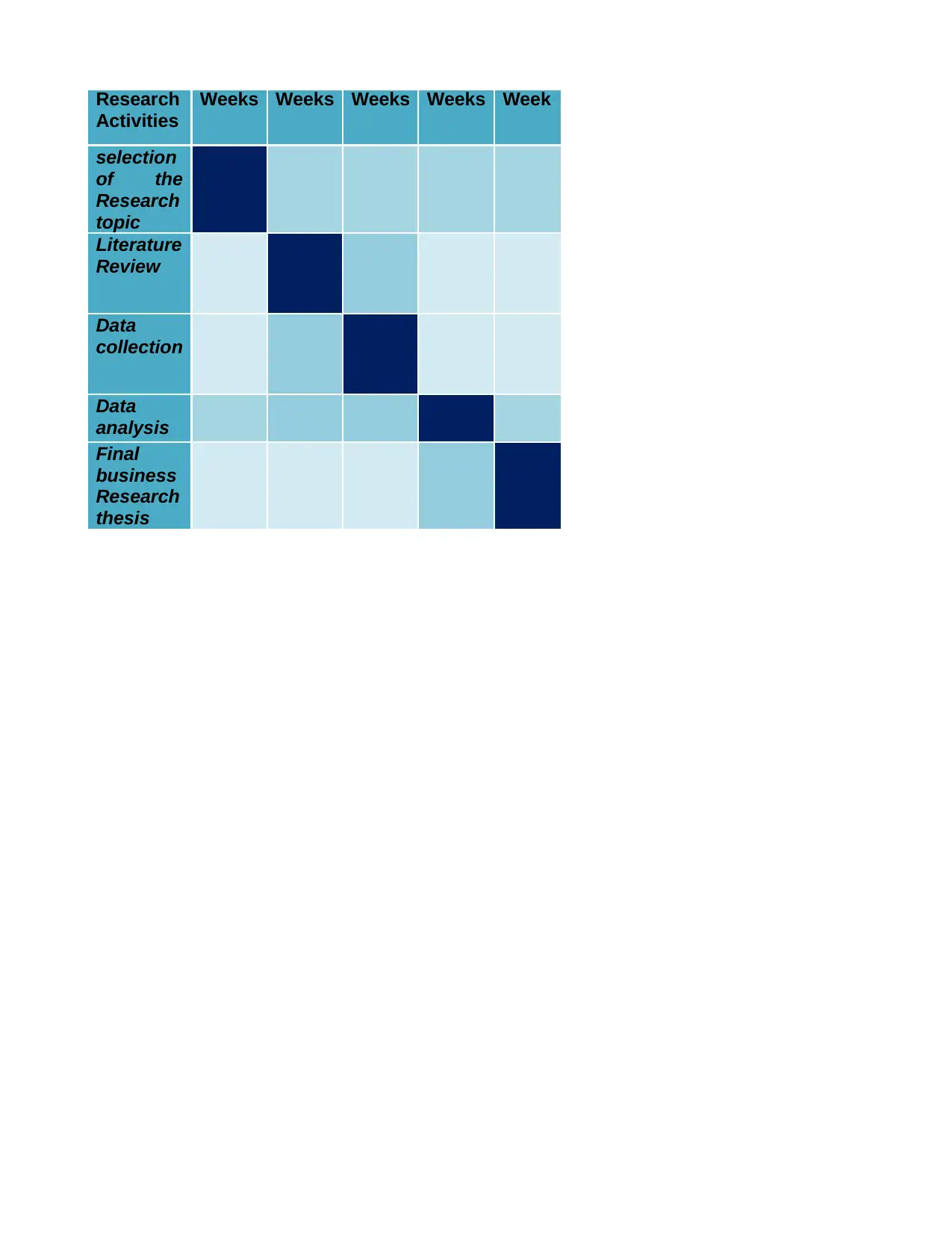
Research
Activities
Weeks Weeks Weeks Weeks Week
selection
of the
Research
topic
Literature
Review
Data
collection
Data
analysis
Final
business
Research
thesis
Activities
Weeks Weeks Weeks Weeks Week
selection
of the
Research
topic
Literature
Review
Data
collection
Data
analysis
Final
business
Research
thesis
Paraphrase This Document
Need a fresh take? Get an instant paraphrase of this document with our AI Paraphraser
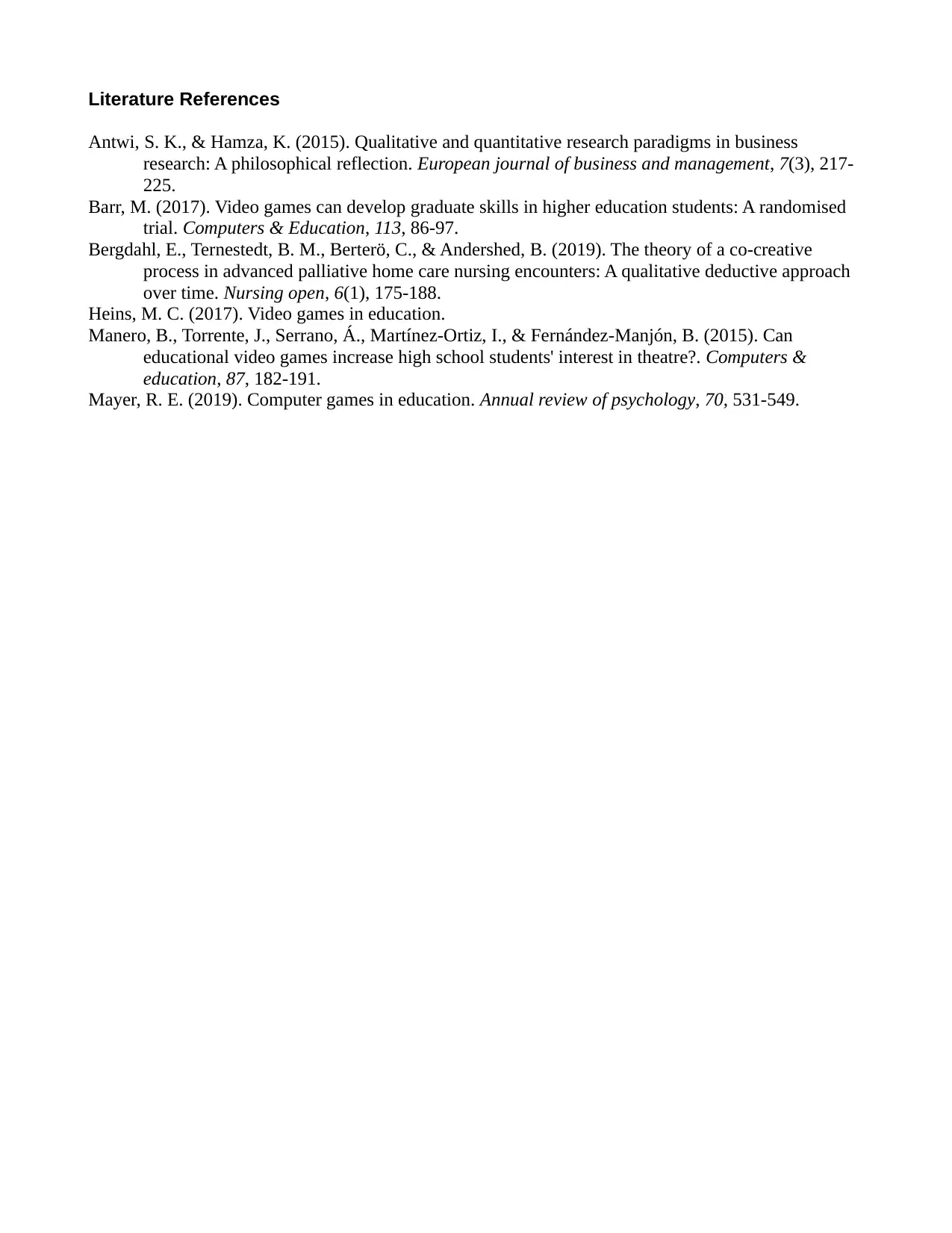
Literature References
Antwi, S. K., & Hamza, K. (2015). Qualitative and quantitative research paradigms in business
research: A philosophical reflection. European journal of business and management, 7(3), 217-
225.
Barr, M. (2017). Video games can develop graduate skills in higher education students: A randomised
trial. Computers & Education, 113, 86-97.
Bergdahl, E., Ternestedt, B. M., Berterö, C., & Andershed, B. (2019). The theory of a co‐creative
process in advanced palliative home care nursing encounters: A qualitative deductive approach
over time. Nursing open, 6(1), 175-188.
Heins, M. C. (2017). Video games in education.
Manero, B., Torrente, J., Serrano, Á., Martínez-Ortiz, I., & Fernández-Manjón, B. (2015). Can
educational video games increase high school students' interest in theatre?. Computers &
education, 87, 182-191.
Mayer, R. E. (2019). Computer games in education. Annual review of psychology, 70, 531-549.
Antwi, S. K., & Hamza, K. (2015). Qualitative and quantitative research paradigms in business
research: A philosophical reflection. European journal of business and management, 7(3), 217-
225.
Barr, M. (2017). Video games can develop graduate skills in higher education students: A randomised
trial. Computers & Education, 113, 86-97.
Bergdahl, E., Ternestedt, B. M., Berterö, C., & Andershed, B. (2019). The theory of a co‐creative
process in advanced palliative home care nursing encounters: A qualitative deductive approach
over time. Nursing open, 6(1), 175-188.
Heins, M. C. (2017). Video games in education.
Manero, B., Torrente, J., Serrano, Á., Martínez-Ortiz, I., & Fernández-Manjón, B. (2015). Can
educational video games increase high school students' interest in theatre?. Computers &
education, 87, 182-191.
Mayer, R. E. (2019). Computer games in education. Annual review of psychology, 70, 531-549.
1 out of 5
Related Documents
Your All-in-One AI-Powered Toolkit for Academic Success.
+13062052269
info@desklib.com
Available 24*7 on WhatsApp / Email
![[object Object]](/_next/static/media/star-bottom.7253800d.svg)
Unlock your academic potential
Copyright © 2020–2026 A2Z Services. All Rights Reserved. Developed and managed by ZUCOL.





